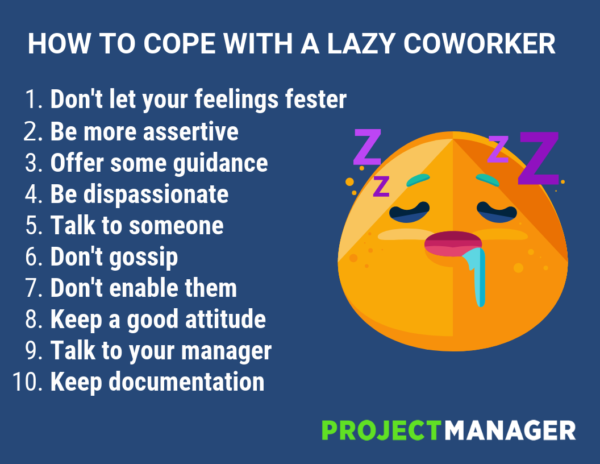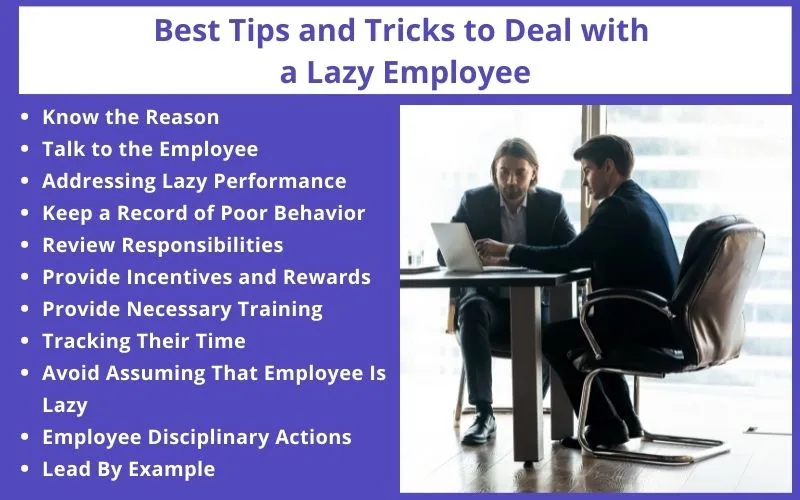How To Deal With Lazy People At Work

The Monday morning sun streamed through the office window, illuminating a scene familiar to many: a flurry of activity punctuated by the quiet hum of computers. Yet, in the midst of the hustle, Sarah noticed a familiar sight – Mark, seemingly engrossed in a non-work-related website, while deadlines loomed and the team struggled to keep up. This scenario, played out in offices worldwide, raises a critical question: How do you effectively navigate the challenge of dealing with “lazy” coworkers?
It's crucial to understand that perceived laziness is often a symptom of underlying issues, not necessarily a reflection of someone's inherent character. Addressing this issue requires a nuanced approach, focusing on open communication, clear expectations, and a supportive environment.
Understanding the Root Cause
Before labeling someone as “lazy,” it's important to consider the potential reasons behind their behavior. Are they lacking motivation? Do they feel overwhelmed by their workload? Perhaps they are facing personal challenges that affect their productivity.
Sometimes, the issue stems from a mismatch between their skills and their assigned tasks. According to a 2023 study by Gallup, employees who feel their strengths are utilized at work are significantly more engaged and productive.
Communication is Key
The first step in addressing the issue is direct, yet empathetic communication. Avoid accusatory language and instead focus on expressing your concerns about the team's overall productivity.
Start by asking open-ended questions. "I've noticed you haven't been contributing much lately. Is there anything I can do to help, or perhaps anything you need to be more efficient with your tasks?" This fosters a sense of collaboration rather than confrontation.
Setting Clear Expectations
Ambiguity in roles and responsibilities can often lead to decreased productivity. Ensure that everyone on the team has a clear understanding of their tasks, deadlines, and performance expectations.
Regularly review project goals and individual responsibilities to ensure everyone is on the same page. Consider using project management tools to track progress and identify potential bottlenecks.
Strategies for Addressing the Issue
Once you've established clear communication and expectations, you can explore specific strategies to address the perceived lack of effort. These strategies should be tailored to the individual and the specific situation.
One approach is to provide opportunities for skill development and training. Investing in employee growth can boost confidence and competence, leading to increased productivity.
Another strategy is to offer more autonomy and control over their work. According to a Harvard Business Review article, empowering employees can significantly increase their engagement and motivation.
Documentation and Escalation
If informal conversations and support strategies fail to yield positive results, it may be necessary to document instances of non-performance. This documentation should include specific examples of missed deadlines, poor quality work, or other observable behaviors that impact the team's productivity.
Share the documentations with your manager or HR department. This allows them to provide further guidance and support, or to initiate formal performance management processes if necessary.
Remember, the goal is not to punish the "lazy" employee, but to help them improve their performance and contribute effectively to the team.
Creating a Supportive Environment
Ultimately, creating a supportive and inclusive work environment is the best way to prevent and address issues of perceived laziness. This includes fostering a culture of open communication, providing opportunities for professional growth, and recognizing and rewarding good performance.
Encourage teamwork and collaboration. When employees feel connected to their colleagues and invested in the team's success, they are more likely to be engaged and productive.
Leading by example is also crucial. When managers and senior leaders demonstrate a strong work ethic and commitment to excellence, it sets a positive tone for the entire team.
Dealing with perceived laziness at work is a complex challenge that requires empathy, communication, and a commitment to creating a supportive environment. By understanding the root causes, setting clear expectations, and providing appropriate support, you can help employees reach their full potential and contribute to a more productive and positive workplace.
As Sarah reflected on the situation with Mark, she realized that addressing the issue wasn't about labeling him as "lazy," but about understanding his challenges and providing him with the support he needed to succeed. It was about creating a work environment where everyone felt valued, motivated, and empowered to contribute their best.


















